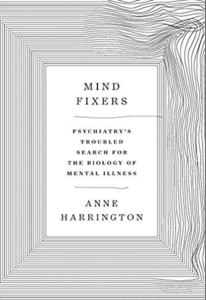 What is mental health? And what is its flip side, mental illness? What can be done to ease mental suffering?
What is mental health? And what is its flip side, mental illness? What can be done to ease mental suffering?
In Mind Fixers: Psychiatry’s Troubled Search for the Biology of Mental Illness, author Anne Harrington doesn’t seek to answer these questions. Instead, she provides two centuries worth of history, describing how health professionals have sought to identify, describe, diagnose and treat mental illnesses.
I read this book with great fascination. Then I read it again. I didn’t mean to. It’s just that when I began paging back through it, I discovered information I hadn’t really absorbed the first time and kept making new connections. Pretty soon I had read the whole thing twice!
Anyone who has wandered the bewildering corridors of mental illness, whether on their own behalf or alongside a loved one, learns that pat answers and clear solutions are not on offer. There is no blood test for mental illness. Treatment usually comes in the form of “try this and see how it goes.” Sometimes things go well and sometimes they don’t.
What Mind Fixers offers to someone who has explored this labyrinth is context. Every current idea about mental illness has a history. That history is tangled in knowledge and trends that move through religion, popular culture, science, and philosophy. Out of this comes a wash of facts, anecdotes and opinions that a person grappling with mental illness must make sense of. Harrington takes this swirl of ideas and assembles them like a jigsaw puzzle.
In the case of my own childhood, Mind Fixers offers context to the names on the prescription bottles in the kitchen cupboard beside the sink. (“Take with food.”) It adds meaning to the tension between my parents over whether these pills, others, or none at all should be taken. It explains why cheese had been banned from the household.
Before I read this book, I knew that in the 70s and 80s, with the closure of state mental institutions across the country, inmates were “turned out onto the streets.” I didn’t know that there had been lawsuits. One affirmed that patients who were committed involuntarily had a right to adequate treatment. Another acknowledged that inmates, who did much of the institutions’ labor, had a right to be paid for their work. Mental institutions had to close because adequate funds to uphold the human rights of the patients were not forthcoming from any quarter.
Harrington walks the reader through the history of the illness which today are called schizophrenia, depression and bipolar disorder. She points out the many different levels of interpretation and judgement that can shape narratives about mental suffering and relief. It is not easy to turn subjectivity into science. Harrington offers a context for treatments like lobotomies and electroshock, as well as for the roles of Big Pharma and the DSM. She explains why some researchers have taken a keen interest in the placebo effect.
I highly recommend this book. Whatever your curiosity about mental health and mental illness, its pages will teach you some new facts and help you connect some new dots.